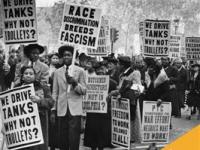Note from the Editor
by Tamara Gaskell
Window on the Collections
by Matthew Lyons
A “case involving human rights”: The Berywn School Desegregation Struggle, 1932–1934
by David A. Canton
Swimming against Segregation: The Struggle to Desegregate Pittsburgh's Municipal Pools
by Jeff Wiltse
Concord Park, Open Housing, and the Lost Promise of Civil Rights in the North
by Thomas J. Sugrue
“The Walls of Jericho Must Come Down”: Civil Rights and Employment in Post–World War II Philadelphia
by Guian A. McKee
Teachers’ Page: From Boycotts to Black Power
by Amy Jane Cohen
Teachers’ Turn: That's Not Fair
by Amy Jane Cohen
Legacies for Kids: Book Reviews
by Sarah Stippich
Freedom Walkers: The Story of the Montgomery Bus Boycott, by Russell Freedman
Rosa, by Nikki Giovanni; illustrated by Brian Collier
Black Stars of the Civil Rights Movement: African Americans Who Lived Their Dreams, by Jim Haskins
A Dream of Freedom: The Civil Rights Movement from 1954 to 1968, by Diane McWhorter
Sit-In: How Four Friends Stood Up by Sitting Down, by Andrea Davis Pinkney; illustrated by Brian Pinkney
There Comes a Time: The Struggle for Civil Rights, by Andrea Davis Pinkney
Book and Web Site Reviews
by Eric Klinek and Dana Dorman
Sweet Land of Liberty: The Forgotten Struggle for Civil Rights in the North, by Thomas J. Sugrue
Up South: Civil Rights and Black Power in Philadelphia, by Matthew J. Countryman
The Problem of Jobs: Liberalism, Race, and Deindustrialization in Philadelphia, by Guian A. McKee
Sticks 'n Stones: The Myers Family in Levittown, by Daisy D. Myers
Leg@cies: Interesting Places to Explore on the Web
Food for Thought: The Private Side of a Public Family
by Alexis Moore Bruton
Image: African Americans protest against the Philadelphia Transportation Company's policy of not hiring black motormen or conductors, Nov. 1943. Federal pressure due to wartime labor shortages led the company to change that policy in the summer of 1944, which sparked a strike by white workers and a military takeover of Philadelphia's transit system as a wartime emergency. Philadelphia Record Photograph Collection, HSP.


